《Unit 1 I wanted to see the Beijing Opera》课件 (3)
Unit 1 I wanted to see the Beijing Opera 课件13
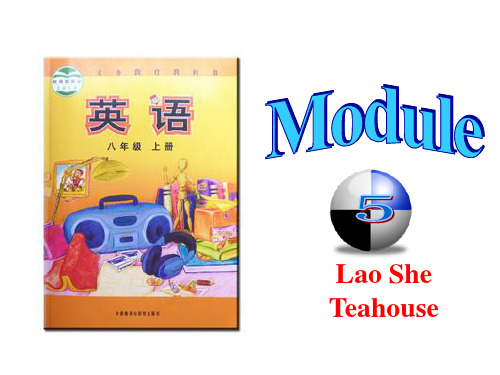
Now check sentences.
(√ )
the
true
√ √ √
1 Tony went to Lao She Teahouse with Betty and Lingling. 2 Betty understood the opera. 3 Lingling and Betty stayed longer than they planned. 4 Betty enjoyed the opera. 5 Betty would like to go to the Beijing Opera again.
老舍茶馆是以老舍先生命名的茶馆,建于 1988年,古香古色、京味十足。可以欣赏 到曲艺、戏剧名流的精彩表演,同时品用 名茶、宫廷细点和应季北京风味小吃。开 业以来,老舍茶馆接待了很多中外名人, 享有很高的声誉。
actress / / teahouse offer end in the end no idea
Lao She Teahouse
Unit 1 I wanted to see the Beijing Opera .
京剧五大行当(角色)
生:诸葛亮、关羽、宋江、 旦:杨贵妃、秦香莲、穆桂英、 净:包公、黄盖、荆轲、 丑:蒋干、时迁、 末: 生中的一个分支,现基本划归为生。
老舍,(1899.02.03日—1966.08.24日), 原名舒庆春, 字舍予。北京满族正红旗人。中国现代小说家、著名 作家,杰出的语言大师、人民艺术家,新中国第一位 获得“人民艺术家”称号的作家。代表作有《骆驼祥子》 《四世同堂》、剧本《茶馆》。1966年,由于受到文 化大革命运动中恶毒的攻击和迫害,老舍被逼无奈之下 含冤自沉于北京太平湖。
Listen and choose the best answer to the following questions. 1.Who did Lingling go to Lao She Teahouse with last night? A.Betty B.Lingling C.Tony 2.What did they do at Lao She Teahouse? A.Drink tea B.See the Beijing Opera C.Both A and B 3.How long did they stay there? A. 1 hours B. 2 hours C. 3 hours
八上外研社英语Unit 1 I wanted to see the Beijing Opera
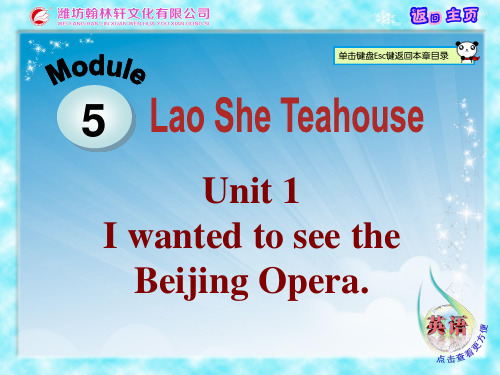
Talk about these questions:
1. Who is Lao She? 2. What do you know about Lao She? 3. What works of Lao She have you read? 4. Have you ever heard about his play Teahouse? 5. What do you think people can do in Lao She Teahouse?
一、用所给词的适当形式填空。
1. She asked me ______ to wait (wait) for her at the cinema. listening (listen) to the radio in the evening. 2. I enjoy ________
3. It is not easy _______ to learn (learn) a foreign language.
famous ___ for writing Teahouse. Lao Shebecame _______ _______
3. It is possible for us to finish the work in three hours. (改为否定句) is __________ impossible for us to finish the work in three It __
5
Unit 1 I wanted to see the at the pictures about Beijing Opera and Lao She
Teahouse.
Lao She Teahouse
Beijing Opera
初中英语_ Module5Unit1IwantedtoseetheBeijingOpera教学设计学情分析教材分析课后反思
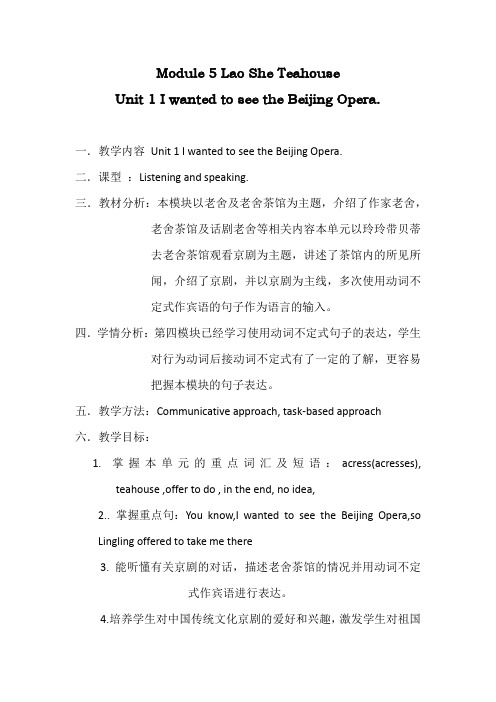
Module 5 Lao She TeahouseUnit 1 I wanted to see the Beijing Opera.一.教学内容Unit 1 I wanted to see the Beijing Opera.二.课型:Listening and speaking.三.教材分析:本模块以老舍及老舍茶馆为主题,介绍了作家老舍,老舍茶馆及话剧老舍等相关内容本单元以玲玲带贝蒂去老舍茶馆观看京剧为主题,讲述了茶馆内的所见所闻,介绍了京剧,并以京剧为主线,多次使用动词不定式作宾语的句子作为语言的输入。
四.学情分析:第四模块已经学习使用动词不定式句子的表达,学生对行为动词后接动词不定式有了一定的了解,更容易把握本模块的句子表达。
五.教学方法:Communicative approach, task-based approach六.教学目标:1. 掌握本单元的重点词汇及短语:acress(acresses),teahouse ,offer to do , in the end, no idea,2.. 掌握重点句:You know,I wanted to see the Beijing Opera,soLingling offered to take me there3. 能听懂有关京剧的对话,描述老舍茶馆的情况并用动词不定式作宾语进行表达。
4.培养学生对中国传统文化京剧的爱好和兴趣,激发学生对祖国传统文化的热爱。
教学重难点:1.掌握本单元的重点单词及词组。
2.掌握动词不定式的用法并复述对话内容。
本节课需准备:ppt课件,挂图,课堂练习及奖品。
八.教学过程:教学步骤:Step 1: Warming-up and Lead in (Activites1,2)1. Greet the students as usual.2. Show a video and talk about it, then lead in the title.T: What is it about? Ss:……..(用京剧及老舍,老舍茶馆图片引入本节课的主题,预先了解本节课内容,活跃了课堂气氛调动了学生的学习兴趣)Step 2 : Pre-listening:1. Show some pictures about Beijing Opera and teahouse. Talk about the new Words: actress, dance , music , play , sing, teahouse , theatre, traditional2. Let the students read the new words together and check them.3. Free talk : Work in pairs and talk about the pictures using the new words.Step 3 : While Listening:1. Play the tape, ask students to listen and underline the correct wordsor expressions. Then check the answers.2.Listen to the conversation and check the true sentences.Step 4 : Reading1.Ask the students to read the conversation and check the answers. (Activity 3)2.Read the conversation with the tape then answer some questions.3. Ask the students to work in groups and act out the conversation.4.Retell the conversation according to the mind map.Step 5 : Post reading1. Work in groups : Ask the students to talk about plans of May DayWhere will they go and talk about the place that they goUse the “offer/plan/decide/to do”help you.(小组合作,给出关键词,通过描述计划既加深知识点的输出课文的掌握,同时也提高了口语的表达能力。
Unit 1 I wanted to see the Beijing Opera课件
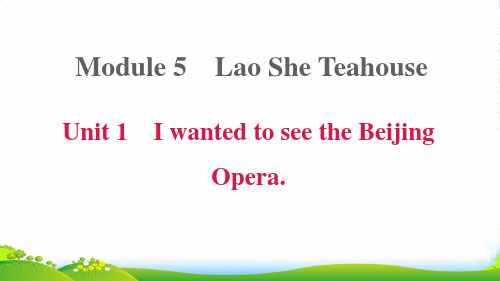
— ____C_.
A. Thank you
B. By air
C. No idea
D. You’re welcome
8. — It’s very important __D___us _____a plan before a
new term.
— Yes. You must try to make it carefully.
13. 如果你努力工作,你的梦想最终会实现的。 Your dream will come true _______in_ ______t_h_e
___e_n_d___ if you wo主要的。 Luckily, you’re safe. _____T_h_a_t’_s_____t_h_e ______m_a_in
根据短文内容及所给提示,写出单词的适当形式。 The Beijing Opera is the quintessence (精粹) of Chinese culture. It is one of the most important operas 1 (戏剧) in China. It has about 200 years’ history. At the early Qing Dynasty (清代), Anhui opera groups were popular 2 (流行的) in South China.
__A___ his play Teahouse.
A. for
B. as
C. to
D. of
三、根据汉语意思完成句子。 11. [ 原创题] 你能带我去最近的餐馆吗? Could you _______ta_k_eme _______t_o_ the nearest restaurant?
初中英语外研版八年级上册《M5 Unit 1 I wanted to see the Beijing
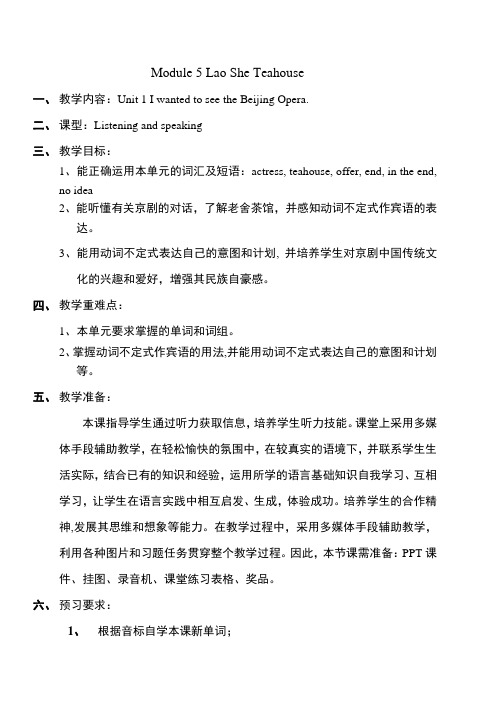
Module 5 Lao She Teahouse一、教学内容:Unit 1 I wanted to see the Beijing Opera.二、课型:Listening and speaking三、教学目标:1、能正确运用本单元的词汇及短语:actress, teahouse, offer, end, in the end,no idea2、能听懂有关京剧的对话,了解老舍茶馆,并感知动词不定式作宾语的表达。
3、能用动词不定式表达自己的意图和计划, 并培养学生对京剧中国传统文化的兴趣和爱好,增强其民族自豪感。
四、教学重难点:1、本单元要求掌握的单词和词组。
2、掌握动词不定式作宾语的用法,并能用动词不定式表达自己的意图和计划等。
五、教学准备:本课指导学生通过听力获取信息,培养学生听力技能。
课堂上采用多媒体手段辅助教学,在轻松愉快的氛围中,在较真实的语境下,并联系学生生活实际,结合已有的知识和经验,运用所学的语言基础知识自我学习、互相学习,让学生在语言实践中相互启发、生成,体验成功。
培养学生的合作精神,发展其思维和想象等能力。
在教学过程中,采用多媒体手段辅助教学,利用各种图片和习题任务贯穿整个教学过程。
因此,本节课需准备:PPT课件、挂图、录音机、课堂练习表格、奖品。
六、预习要求:1、根据音标自学本课新单词;2、查找相关资料,找出你认为本课较重要的语言点和短语。
七、教学过程:达标训练题一、单项选择()1. He stayed at home for ________ hour.A. aB. anC. theD. \()2.The old man was badly ill and we _____ him _____ hospital right away.A. take; toB. bring; toC. took; toD. brought ; to ()3. It is difficult for the boy _______ English well.A. learnB. learnsC. to learnD. learning()4. –Don’t forget _______ your homework.- OK. I’ll do it right now.A. doingB. doC. to doD. did()5. Would you please show me the way _________ the bank?A. inB. forC. withD. tot二、根据汉语完成句子,每空一词。
Module5Unit1IwantedtoseetheBeijingOpera.知识点课件英语八年级
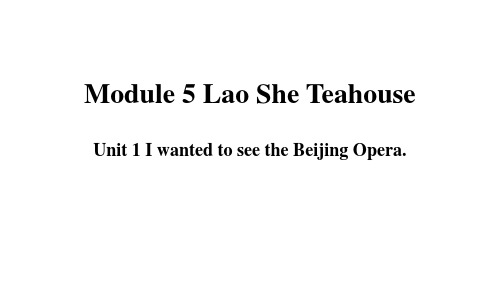
(1)作动词,意为"结束;终止"。①end with+具体名词(a song/dance等) 以……结束(强调方式)②end in+抽象名词(failure/divorce等) 以……结束(强调结果)
(2)作名词,意为"(时间、事件等的)结局;末端,尽头"。①the end of ……的末尾②at the end of 在……尽头/结束时(可表示地点或时间)③by the end of 到……末为止(常表示时间)
语境串记He asked the kids to find several keys in the house at the end of the road by the end of 11:00. In the end, only one kid finished the task.他要求孩子们在11点之前找到放在路尽头的那所房子里的几把钥匙。最后,只有一个孩子完成了任务。
A
【解析】句意:——在过去的五年内,中国在"一带一路"中扮演着重要角色。——它给很多国家提供了一个交流的好机会。offer"提供",support&#;导演"。由语境可知选A。
教材语境 But the actors and actresses were excellent. 但是男女演员都很出色。(教材P34)
教材语境 You know,I wanted to see the Beijing Opera,so Lingling offered to take me there. 你知道的,我想看京剧,所以玲玲提出带我去那里。(教材P34)
you know 你知道的
常用于口语,用来对某事进行解释,表达自己的看法或提供更多的信息。
《I wanted to see the Beijing Opera》PPT课件
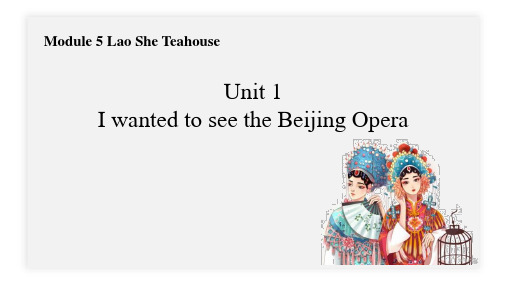
A. lent
B. took
С. offered
D. brought
2. Chorlin wants _______ a job as an English teacher in China.
A. finding
B. to find С. finds D. find
3._____ is not easy for everyone to learn English well.
【要点】actress名词,意为“女演员”。其对应词为actor“男演员”。 【例】She is my favourite actress.
她是我最喜欢的女演员。
5 5
3 We only planned to watch for an hour, but in the end, we stayed for three hours. 我们本来计划只看一个小时,但最后我们待了三个小时。
They offcred me a very good job. = They offered a very good job to me. 他们给我提供了一份很好的工作。
5
1 You know,wanted to see the Beijing Opera, so Lingling offered to take me there. 你 知道,我想看京剧,因此玲玲提议带我去那里。
5 5
Part 2
单词句子知识详解
Pellentesque Habitant
5 5
the Beijing Opera
5
actor
actress
teahouse Lao She Teahouse
Pellentesque Habitant
Unit 1 I wanted to see the Beijing Opera
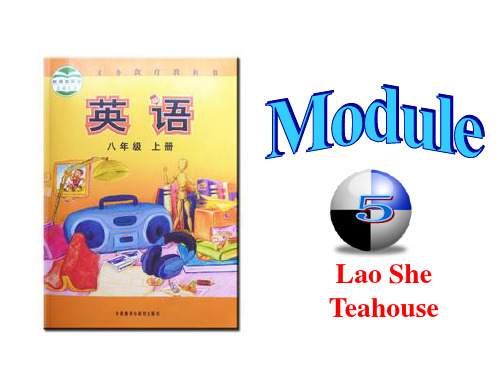
4.My friends offered_______a film with me tonight. A. to see B. see C.saw 5.—Does he like swimming? ---_______. A. No idea B. Yes, I do. C. No, he does. 6.They stayed______than they planned. A.long B.longer C.longest 7.I like Beijing Opera, do you enjoy____? A. it B. its C. them
Complete the sentences freely
make an apple pie 1.I want to_____________________________.
2.They offered to________________________. have a party at home 3.I hope to_____________________________. have a small plane one day 4.My father decided to___________________. clean his car 5.Mr Li tried to_________________________. move the heavy box 6.Children love to_______________________. play games
英语语句中的重读规则即对所强调的 信息进行重读。在含有动词不定式的 语句中,动词和名词往往重读,介词、 连词、助动词弱读。
5 Read and predict which words in the answers the speaker is likely to stress. 1 -Do you want to see the Beijing Opera? -Yes, I’d love to. 2-Do you want to come to Lao She Teahouse with me? - Yes, please. I’d like to go with you. 6 Work in pairs. Read the conversations Now listen and check. in Activity 5 aloud.
《Unit 1 I wanted to see the Beijing Opera》课件 (1)
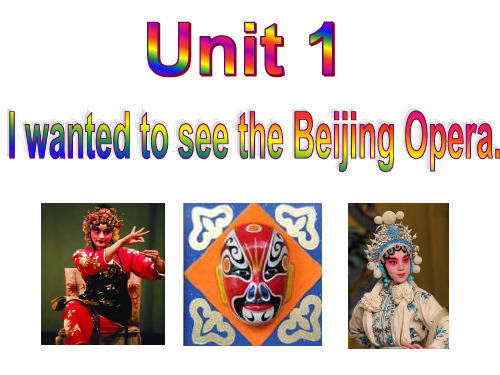
Homework
Write six sentences with the structure”to do”, use the words we have learned today.
New words
• • • • actress teahouse offer end
• in the end • no idea
n. 女演员 n. (尤指亚洲)的茶馆 v. 提议;提出 n. (时间的)最后一段、末尾 v. 结束 最后;终于 不知道
Listening
• 1. Listen and underline the correct words and expressions of Activity 2 on your book. • 2. Listen to the tape of Activity 3 for the first time and finish the exercise on your paper.
3. ... but in the end, we stayed for three hours.
„„ 但是最后, 我们待了三个小时。
in the end “最后;终于”,相当于at last 或者
finally
(in the end 、at last 具有较浓厚的感情色彩,表示
经过一番努力或曲折的过程之后才实现;而finally
5. He’s especially famous for his play Teahouse. 他尤其因他的话剧《茶馆》而闻名。 be famous for 以/因为……而著名 be famous as 作为……而著名 纽约以高楼大厦而闻名。 New York is famous for tall buildings. _____________________ 鲁迅是位著名的作家。 ________________________ Lu Xun is famous as a great writer.
Unit 1 I wanted to see the Beijing Opera教案13
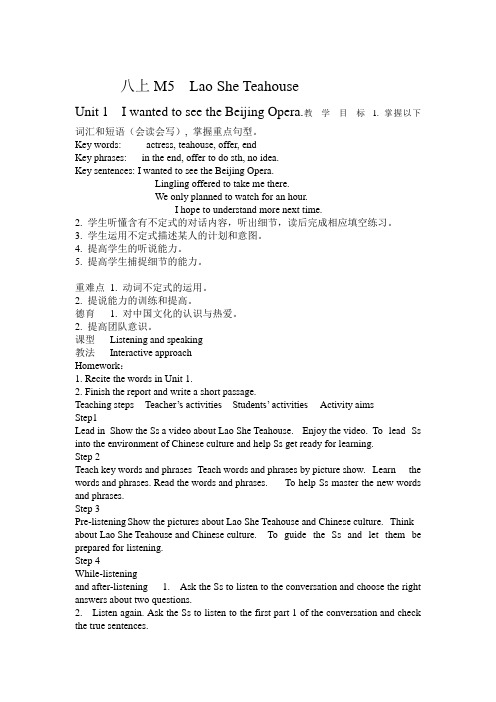
八上M5 Lao She TeahouseUnit 1 I wanted to see the Beijing Opera.教学目标 1. 掌握以下词汇和短语(会读会写), 掌握重点句型。
Key words: actress, teahouse, offer, endKey phrases: in the end, offer to do sth, no idea.Key sentences: I wanted to see the Beijing Opera.Lingling offered to take me there.We only planned to watch for an hour.I hope to understand more next time.2. 学生听懂含有不定式的对话内容,听出细节,读后完成相应填空练习。
3. 学生运用不定式描述某人的计划和意图。
4. 提高学生的听说能力。
5. 提高学生捕捉细节的能力。
重难点 1. 动词不定式的运用。
2. 提说能力的训练和提高。
德育 1. 对中国文化的认识与热爱。
2. 提高团队意识。
课型Listening and speaking教法Interactive approachHomework:1. Recite the words in Unit 1.2. Finish the report and write a short passage.Teaching steps Teacher’s activities Students’ activities Activity aimsStep1Lead in Show the Ss a video about Lao She Teahouse. Enjoy the video. To lead Ss into the environment of Chinese culture and help Ss get ready for learning.Step 2Teach key words and phrases Teach words and phrases by picture show. Learn the words and phrases. Read the words and phrases. To help Ss master the new words and phrases.Step 3Pre-listening Show the pictures about Lao She Teahouse and Chinese culture. Think about Lao She Teahouse and Chinese culture. To guide the Ss and let them be prepared for listening.Step 4While-listeningand after-listening 1. Ask the Ss to listen to the conversation and choose the right answers about two questions.2. Listen again. Ask the Ss to listen to the first part 1 of the conversation and check the true sentences.3. Ask the Ss to listen to the first part 2 of the conversation and answer two questions.1. Listen to the conversation carefully and choose the right answer..2. Listen to the part 1 carefully and check the true sentences.3. Listen to the part 2 carefully and answer two questions. To help Ss understand the conversation better. To help Ss grasp the language points and grammar: infinitive. Step 5Reading 1. Have the Ss watch the video and read the conversation sentence by sentence.2. Ask Ss to read by themselves.3. Ask Ss to complete the passage with the words in the box. 1. Watch the video and read the conversation sentence by sentence.2. Read the conversation by themselves.3. Complete the passage with the words in the box and read it aloud. To understand the conversation better and grasp the language points .Step 6Brain Storm Have Ss think and find out the infinitive structure and brainstorm infinitive phrases. Think and find out the infinitive structure and brainstorm infinitive phrases. To understand and grasp the grammar: infinitive.Step 7Pair workHave Ss practise infinitive by doing pair work. Do a pair work to practise infinitive.To practise and use infinitive.Step 8Pair work:interview Tell the rules:1. One student for asking questions.2. The other student answer the questions.3. Do the report.Ask and answer and do a report in pairs. To stimulate the Ss’ interests and practise the grammar and the key sentences.Step 9Summary Ask Ss to summarize the main points. Summarize together. To help the Ss remember the key points.。
Unit 1 I wanted to see the Beijing Opera教案13
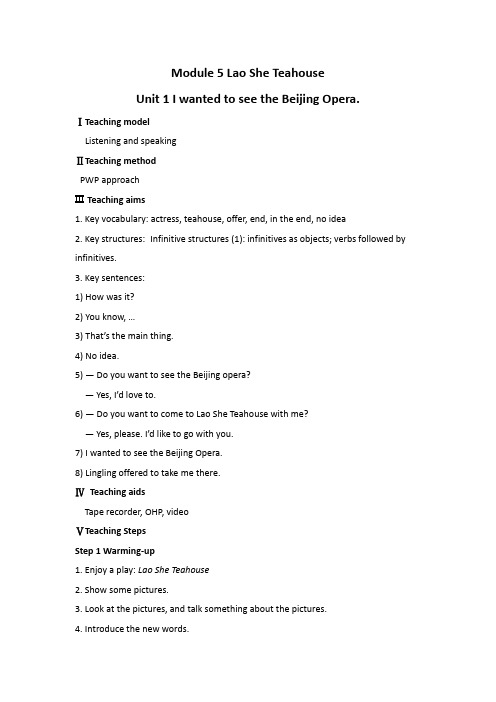
Module 5 Lao She TeahouseUnit 1 I wanted to see the Beijing Opera.ⅠTeaching modelListening and speakingⅡTeaching methodPWP approachⅢ Teaching aims1. Key vocabulary: actress, teahouse, offer, end, in the end, no idea2. Key structures:Infinitive structures (1): infinitives as objects; verbs followed by infinitives.3. Key sentences:1) How was it?2) You know, …3) That’s the main thing.4) No idea.5) — Do you want to see the Beijing opera?—Yes, I’d love to.6) — Do you want to come to Lao She Teahouse with me?—Yes, please. I’d like to go with you.7) I wanted to see the Beijing Opera.8) Lingling offered to take me there.ⅣTeaching aidsTape recorder, OHP, videoⅤTeaching StepsStep 1 Warming-up1. Enjoy a play: Lao She Teahouse2. Show some pictures.3. Look at the pictures, and talk something about the pictures.4. Introduce the new words.5. Learn the new words.6. Read the new words.Step 2 Work in pairs.1. Ask the students to read the words in the box in Activity 1.actress dance music play sing teahouse theatre traditional2. Look at the pictures in Activity 1, and talk about them.3. Work in pairs. Use the words from the box to help you.Step 3 Listening practice.1. Ask the students to read through the sentences in Activity2.1) Betty often sees / wants to see some traditional Beijing opera.2) Betty knows / doesn’t know Lao She Teahouse.3) Lingling says that the opera is easy / difficult to understand.2. Play the recording once without stopping.3. Listen and underline the correct words.4. Play the recording again and ask the whole class to check with a partner.5. Check the answers:Keys: 1. wants 2. doesn’t know 3. difficultStep 4 Listen and read.1. Show some pictures, and ask the students to talk about them.2. Ask the students to read the conversation silently.3. Play the recording and ask the students to listen and read the conversation.4. Read the conversation.5. Act it out.6. Learn “Everyday English”1) How was it?2) You know, …3) That’s the main thing.4) No idea.Step 5 Check the true sentences.1. Ask the students to read the conversation again.2. Now check the true sentences.1) Tony went to Lao She Teahouse with Betty and Lingling.2) Betty understood the opera.3) Lingling and Betty stayed longer than they planned.4) Betty enjoyed the opera.5) Betty would like to go to the opera again.6) Betty knew about Lao She before she went to the teahouse.3. Ask the students to check with a partner.4. Check the answers:Keys: 1. ×2. ×3. √4. √5. √6.×Step 6 Complete the passage.1. Ask the students to read the words in the box in Activity 4.actress difficult end main offer2. Read through the passage.Betty wanted to see the Beijing opera, so Lingling (1) ________ to take Betty to Lao She Teahouse. The words of the opera were (2) ________ to understand, but the actors and (3)__________ were excellent. They only planned to watch for an hour, but in the (4) ________, they stayed for three hours. Betty thought it was interesting — that was the (5) ________ thing!3. Complete the passage with the correct form of the words from the box.4. Ask the students to check with a partner.5. Check the answers:Keys: 1. offered 2. difficult 3. actresses 4. end 5. mainStep 7 Listen and repeat.1. Play the recording once without stopping.2. Play the recording again and ask the whole class to repeat.1) — Do you want to see the Beijing opera?—Yes, I’d love to.2) — Do you want to come to Lao She Teahouse with me?—Yes, please. I’d like to go with you.3. Ask the students to listen and mark the intonation.4. Now listen again and repeat.Step 8 Work in pairs.1. Ask the students to read the conversations in Activity 5 aloud.2. Make true sentences.1) I want to ___________ next week.2) They offered to ___________.3) I hope to ___________ one day.4) My parents agree to ____________ on Saturday.3. Talk about something you’d like to do or s ee.— I want to go to Xinjiang and ride horses.—…。
外研版八上英语M5 UNIT1 I wanted to see the Beijing Opera
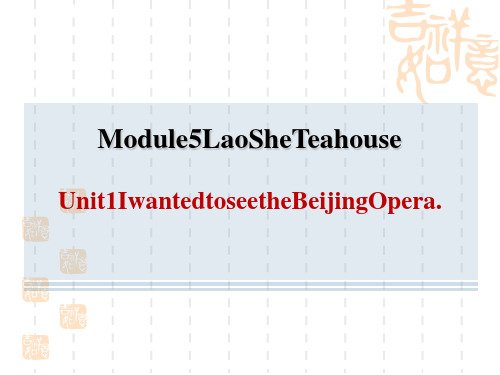
【 点 拨 】hopetodosth.“ 希 望 做 某 事 ” , 无 hopesb.todosth.这一用法。
2. LaoSheisfamous______A__hisplays________awriter. A. for; asB. as; for C. for; inD. as; in
剧).
Opera
WangPeiyuisdoingsomethingstomakemoreyoungpeoplef
allinlovewiththeart.
二、根据汉语意思完成句子, 并背记英语句子 6. 玲玲主动提出带我去那里。 Lingling____________________takemethere.
Teahouse
3. Ourteacherisverykindandalways______o_f_f_e_r(s提供)
hishelptous.
4. MrBluegaveawarmspeechatthe__________(结尾)
oftheclassparty.
end
5. Fewoftoday'syoungpeopleliketheBeijing_________ (戏
4 end
9 that'sthemainthing
5 Opera
10 especiallyf考点
6D
答案呈现
2A
7 hopetosee
3D
8A
4 actor
9A
5 attheendof; bytheendof; Intheend
习题链接
1A 2A 3C 4C 5C
Unit 1 I wanted to see the Beijing Opera教案06
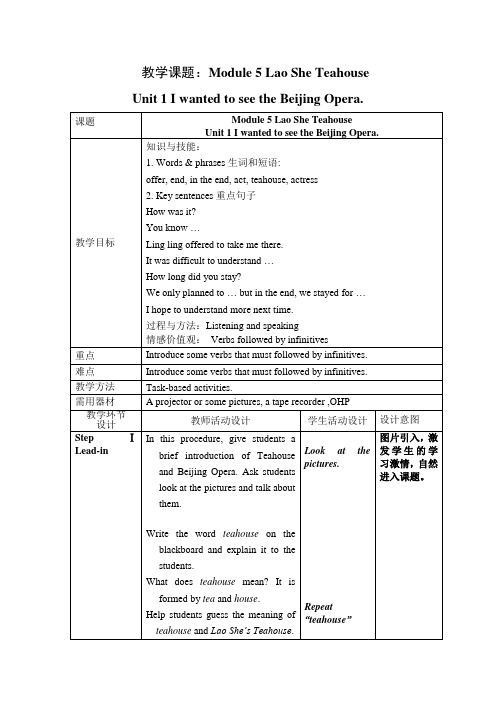
What doesteahousemean? It is formed byteaandhouse.
Help students guess the meaning ofteahouseandLao She’s Teahouse.
How long did you stay?
We only planned to…but in the end, we stayed for…
I hope to understand more next time.
过程与方法:Listening and speaking
情感价值观:Verbs followed by infinitives
Sample conversation:
In this procedure, students will listen to and read a dialogue, then they will answer some questions and do some exercises to further understand the dialogue. At the same time, they will learn some new words and expressions, especially some verbs followed by infinitives.
offer,end, in the end, act, teahouse, actress
2. Key sentences重点句子
How was it?
Youknow …
I wanted to see the Beijing Opera
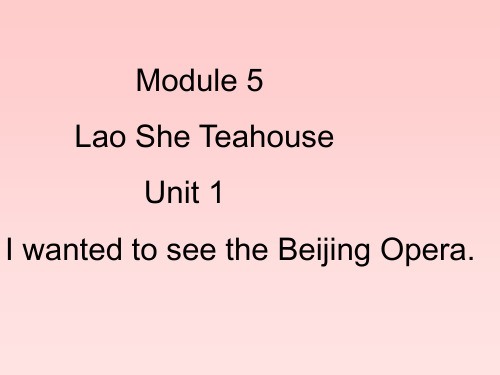
用所给单词的正确形式,完成句子。 1I wanted __to__s_e_e___ the Beijing Opera.(see) 2 Lingling offered t_o_t_a_k_e___ me there. (take) 3It was difficult _to__u_n_d_e_r_st_a_n_d_ the words.(understand) 4 We only planned _to__w_a_tc_h__ for an hour.(watch)
A Two weeks ago B Last month C Last night. 2 Who is Lao She? A _______. A doctor B writer C singer
Read aloud after the audio. Read the dialogue and find out the answers. 1 Who took Betty to Lao She Teahouse?
Betty: Lingling and I went to Lao She Teahouse last night. Tony: How was it? Betty: It was great! You know, I wanted to see the Beijing Opera, so Lingling offered to take me there. We drank tea and watched an opera. Tony: Did you understand the opera? Betty: No, it was difficult to understand the words. But the actors and actresses were excellent. Tony: How long did you stay? Betty: We only planned to watch for an hour, but in the end, we stayed for three hours. Tony: Did you enjoy it? Betty: Well, it was interesting——that’s the main thing. I hope to understand more next time. Tony: Do you often go to see the Beijing Opera, Lingling? Lingling: No, I don’t. I wanted to take Betty to the teahouse because it’s famous. Tony: Who is Lao She? Betty: No idea. Ask Lingling. Lingling: Lao She is a great writer. He’s especially famous for his play Teahouse.
- 1、下载文档前请自行甄别文档内容的完整性,平台不提供额外的编辑、内容补充、找答案等附加服务。
- 2、"仅部分预览"的文档,不可在线预览部分如存在完整性等问题,可反馈申请退款(可完整预览的文档不适用该条件!)。
- 3、如文档侵犯您的权益,请联系客服反馈,我们会尽快为您处理(人工客服工作时间:9:00-18:30)。
to play the guitar I have decided to learn ____________________.
9
Think of an event in your life and describe it.
I wanted to… My parents offered to…
They agreed to…
3. Sally _____ understand Beijing Opera. A. didn’t B. could C. almost didn’t
4. — How long did they stay? — They stayed for _____. A. 3 hours B. 2 hours C. 1 hour
母亲答应给我买支新钢笔。
② to 作介词,其后跟表示“计划,条件,建议”之类 的 名词或代词。
They have agreed to our plan.
他们已同意我们的计划。
True (T) or False (F).
1. Sally, her parents and Lingling went to Lao She Teahouse last night.
5. What do you think people can do in Lao She Teahouse?
老舍
1
Where do you think Lingling and Sally went, and why?
Beijing Opera play teahouse
2
Listen and number the sentences as you hear them.
Module 5 Lao She Teahouse
Unit 1
I wanted to see some Beijing Opera.
Words and expressions
main interest adj. n. 主要的;最大的 兴趣;爱好
offer
agree almost
v.
v.
提议;(主动)给予
4 What’s Sally’s interest? Her main interest is music.
Speaking
8
Make true sentences for you.
do sports next week. 1. I have decided to ________ cook for me. 2. They offered to _____ be a singer one day. 3. My hope is to _________ go for a walk on Saturday. 4. My parents agreed to ____________
design the most beautiful bags one day. I hope to ______________________
sit in the balloon and travel all over the world I wanted to _______________________________________.
Choose the best answer for each sentence.
1. Sally and _____ went to Lao She Teahouse last night. A. Tony B. Lingling C. Betty
2. Sally’s main interest is _______. A. music B. maths C. English
5. Lao She was a(n) ________. A. actor B. waiter C. writer
Language points
1. Sally’s main interest is music.
萨莉的主要兴趣是音乐。 interest 作名词时,意为“兴趣,趣味”。 take (an) interest in… 对……发生兴趣
to get (get) someone to help us. 4. He agreed _____
to play (not play) in the street. 5. I told him not _________
come (come) with me? 6. Would you like to ______
2 What is Lao She most famous for? He’s especially famous for Teahouse. 3 Did Sally find the opera easy to understand? No, she found it impossible to understand.
6
Answer the questions. Use the words in the box.
especially impossible main only
1 Did they plan to stay for two hours?
No, they only planned to have some tea.
Talk about these questions:
1. Who is Lao She? 2. What do you know about Lao She? 3. What works of Lao She have you read?
4. Have you ever heard about his play Teahouse?
To understand more. 7. Have Betty and Tony ever heard of Lao She?
They’ve never heard of him.
5
Match the sentences in Activity 2 with these sentences.
agree decide hope offer plan want
a VCD player for us My parents offered to buy _____________________.
after these pandas They agreed to look ____________________.
live with kinds of My hope is to _______________ animals and make friends with them ________________________________.
4. How much did Sally understand? Not very much. 5. Why do you think they decided to stay for two hours? Because it was interesting.
6. What does Sally want to do next time?
1. She offered to take us there. b 2. They planned to stay for some tea.
f
d c
3. They decided to stay longer. e
4. We wanted to see the teahouse. 5. I hope to go there again one day. 6. My parents agreed to take us. 你能总结出它们的用法吗? a
② offer to do sth 提出要做某事
She offered to buy a colour TV. 她提出要买一台彩电。
3. So my parents agreed to take us.
因此我父母同意带我们去。
agree to 的用法: ① to 作为动词不定式符号,其后跟动词原形,作“同 意(答应)做…… ”解; My mother agreed to buy a new pen for me.
2. Sally didn’t want to see Beijing Opera.
3. Lingling wanted toy understood Beijing Opera well.
5. They had a good time. 6. Betty knows Lao She very well.
同意
adv. 几乎 不可能的
impossible adj. whisper special
v. & n. 低语;耳语 adj. 特别的;特殊的
话剧《茶馆》 Lao She Teahouse
Lao She Teahouse
Inside of Lao She Teahouse
Beijing Opera Show
Listen again and check the sentences.
1. Sally wanted to see some Beijing Opera so her parents
took her there. F
2. Lingling likes Beijing Opera, too. F 3. Sally understood Beijing Opera very well. F 4. Teahouse is Lao She’s play. T
4
Answer the questions.
1. What does Sally like to do? She likes to listen to music. 2. Why did Sally want to go to Lao She Teahouse? To see some Beijing Opera. 3. Why did Lingling want to go to the Teahouse? To see the Teahouse.
